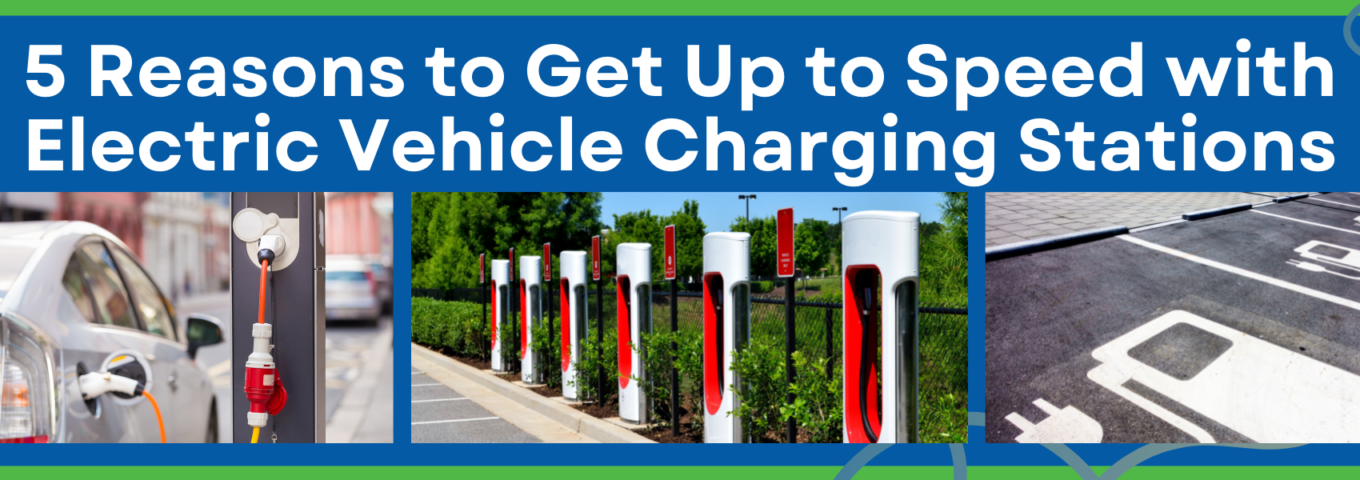5 Reasons to Get Up to Speed with Electric Vehicle Charging Stations
With the rising cost of crude oil and growing concerns about climate change, federal/state regulators and car/truck manufacturers alike are steering away from gas-powered vehicles. There are nearly two million electric vehicles on the roads in the US and that figure is expected to surge in the coming years. Undoubtedly, when this growing population of EV drivers travels, they will seek out facilities with charging capabilities.
A valuable amenity to the rising number of EV drivers on the road, here are five ways that providing charging stations can also benefit the properties on which they are built.
- Attract High-Value EV Driving Guests
Whether the property is residential or commercial, the most obvious benefit of installing charging stations is attracting EV owners. With the low supply and increasing demand, offering this service will literally put it on the map of search engines such as GoogleMaps, PlugShare, ChargeHub, and more. For drivers with range anxiety, the fear of running out of battery power before finding a charging station, it also offers peace of mind, which garners brand loyalty.2. Generate Revenue
In addition to drawing in new clientele, EV charging stations can create a valuable new revenue stream. Despite upfront installation costs and ongoing network fees, charging guests and non-guests per use can quickly turn to profit, especially if the property is located within walking distance of shops, restaurants, or tourist destinations. Another potential source of revenue is selling advertising on EV charging displays. - Redeem Rebates and Incentives
Now is an excellent time to investigate EV charging station options because there are many tax incentives and rebates at the federal, state, and local levels available. For example, in New Jersey, the PSE&G utility company rebate is offering commercial properties (including multi-family residential properties) $7,500 per Level 2 charger, up to $30,000. - Visually Promote a Commitment to Sustainability
Consumers increasingly expect “green” options and EV chargers are a highly visible way to demonstrate a commitment to sustainable transportation. Whether it is a housing complex or retail organization, outlets for EVs will publicly showcase the brand as an environmental steward. - Stay Ahead of Greenhouse Gas Emission Reduction Regulations
In 2020, the governor of California signed an executive order banning the sale of new gas-reliant vehicles in the state as of 2035. Cities in more than 11 states have mandated a required number of parking spots be set aside for EV stations. In August of 2021, the Biden administration announced an executive order that earmarked $7.5 billion to create a nationwide network of EV charging stations. Clearly, government-led green initiatives are pushing EV adoption. Installing EV supply equipment is a great way to stay ahead of greenhouse gas emission reduction regulations.
Get Up to Speed with EV Chargers
When a property is ready to invest, the first step is to hire an electrical engineer. They will evaluate the building’s existing electrical systems and current capacity, calculate anticipated energy loads, specify any upgrades that may be necessary, and coordinate with the local utility company. Like any other electrical installation, chargers are required to comply with the construction codes, so engineering design plans and specifications will be needed.
“You have to do it right the first time,” says CoolSys Energy Design President Allan Samuels. “If you want to take advantage of financial incentives, it is imperative that you hire the correct engineer who knows and understands the various requirements for federal, state, municipal, and utility rebates and tax credits. Likewise, it is crucial to choose the correct system for your property as the initial installation will dictate the options for charging customers moving forward.”
Overall, electric vehicle charging stations are a valuable investment. They can attract EV drivers, create a new stream of revenue, visually showcase a commitment to sustainability, and help put the property ahead of environmental regulations.
About the Author:
Casey Sky Noon is a Business Development Coordinator at CoolSys Energy Design, a full-service mechanical, electrical, plumbing, refrigeration, and fire protection engineering firm. Championing climate mitigation and adaptation plans, she is especially interested in helping buildings become as energy-efficient and environmentally conscious as possible while reducing operating costs and maximizing comfort.

